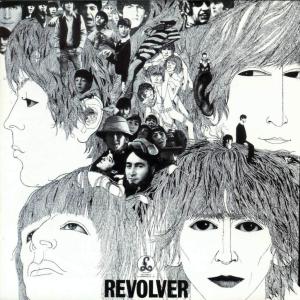
There is a case to be made for Revolver as the greatest album The Beatles ever made. It sounded unlike any Beatles record before or since. Their seventh studio album arrived on August 5, 1966; eight months after Rubber Soul and nine months before Sgt. Pepper’s Lonely Hearts Club Band. Rubber Soul was the record where the Beatle boys became Beatle men…as artists anyway. It’s the point where they began writing weightier lyrics, as well as incorporating different sounds into the mix. Of course Sgt. Pepper’s legendary music was extremely ambitious, top to bottom. It changed the way we consider rock albums. Sgt. Pepper’s, concept, the cover art…every facet of it made a statement of artistic expression.
But Revolver showed the band to be at full throttle; virtually bursting with excitement, cocky confidence and creativity. This record rocked with the exuberance of what it must have felt like to be a Beatle, and knowing that you are making history with each new release. It sounded like they were having a blast. It was an electric guitar record with very few acoustic guitars to be found anywhere.
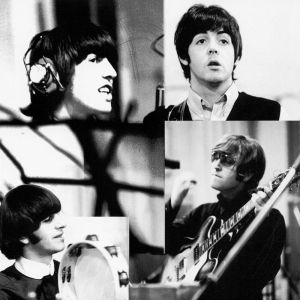
It was released a week before what would be their final tour. None of Revolver’s songs made the cut for that tour; they didn’t feel they could do them justice in a live setting, especially amid the screaming that had become such an albatross for them at every live show. They had grown weary of such bedlam, and their last show would take place in San Francisco, 24 days after Revolver’s release.
So, what was it that made this album so great?
Well, all of the Beatles’ albums were great and unique. You have to remember that The Beatles’ entire recording career lasted only seven years from 1963 to 1969. Sort of boggles the mind doesn’t it? The Eagles could’ve knocked out maybe two albums in that length of time.
It was sort of a crazy time for the band. Five months earlier, John had given an interview to the London Evening Standard in which he stated that Christianity was in decline and that the Beatles had become more popular than Jesus Christ.
“Christianity will go. It will vanish and shrink. I needn’t argue about that; I’m right and I’ll be proved right. We’re more popular than Jesus now; I don’t know which will go first – rock ‘n’ roll or Christianity. Jesus was all right but his disciples were thick and ordinary. It’s them twisting it that ruins it for me.”
It caused nary a ripple until the remark was posted in a US teen magazine around the time of Revolver’s release.
Then all hell broke loose.
There were huge protests in the southern US, and some radio stations stopped playing their records. Their records were burned in huge organized bonfires. There were death threats and, believe it or not, there was even picketing by the Ku Klux Klan, who nailed a Beatles LP to a wooden cross. It’s no wonder they didn’t feel like touring anymore.
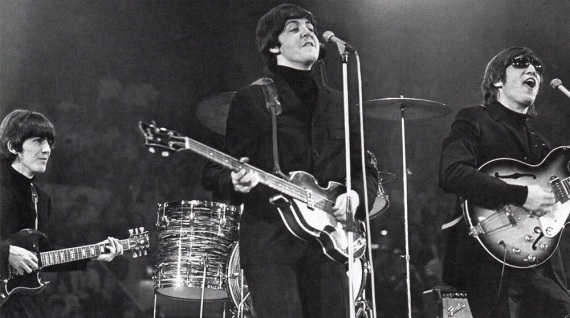
So, this was the climate in which Revolver was received in August of 1966. The album did eventually gain momentum though, and with America’s short attention span in play…and many sincere John Lennon apologies later…no permanent harm was done. It hit number one on the charts and stayed there for six weeks.
I think that, song for song, Revolver contains the best songwriting of any Beatles record. They really sound like they love each other’s company on this album. Also, the band began using the studio in wildly creative ways, treating it as, essentially, another instrument. Producer George Martin and recording engineer Geoff Emerick were indispensable as they invented myriad ways to help bring the band’s experimental ideas to fruition in the studio. Out of those sessions came “Paperback Writer” and the B-side “Rain.” If you can believe it, those two amazing tunes didn’t even make the cut on Revolver.
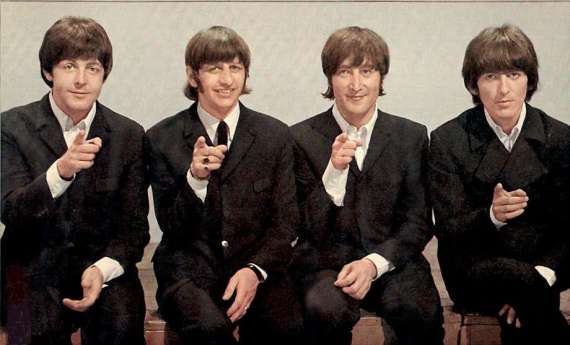
John, George and Ringo experimented with LSD during this time, and John and George developed interest in Eastern philosophy and spirituality. Revolver marked the beginning of The Beatles’ “psychedelic period.”
THE COVER
The cover illustration was created by bassist and artist Klaus Voorman, one of the band’s oldest friends. Part line drawing and part collage, it included photographs by Robert Whitaker. It won a Grammy for Best Album Cover, Graphic Arts. The original title was Abracadabra, until they found that another band had used it. Other working titles for the album were Four Sides of the Eternal Triangle, Magic Circles, Beatles on Safari, and Pendulum. The title Revolver was a pun that referred to a handgun and the “revolving” motion of the record playing on a turntable.
The US release of Revolver contained 11 songs and the original UK release carried 14 tunes. For this profile, we will be writing about the original UK version; 14 songs clocking in at 34 minutes and 43 seconds. Okay, enough talk. Let’s get to the music. (Quality Beatles songs are poorly represented on YouTube but I’ll include a link when I can find one, even if it’s a later live version.)
SIDE 1
- “Taxman” (2:39) – Kudos to George Harrison for getting the leadoff song on a Beatles record. He would deliver three songs on Revolver, and the band now had three major songwriters. “Taxman” was a protest on Britain’s high marginal tax rates. Apparently George freaked out when he realized where all his money was going.
“If you drive a car, I’ll tax the street
If you try to sit, I’ll tax your seat
If you get too cold I’ll tax the heat
If you take a walk, I’ll tax your feet”
Musically, it is a taut, muscular rocker with an R&B groove and is a perfect opener for the record. Paul McCartney handled the quirky, snarling guitar solo and it was a standout performance.
https://www.youtube.com/watch?v=y8OgkjcW0g4
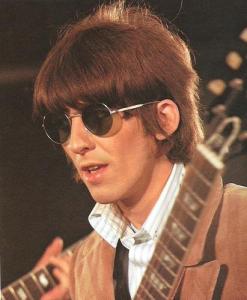
- “Eleanor Rigby” (2:06) – For sure, this was an unusual Beatles song and was quite a mature and sophisticated piece of work for a 24-year old kid like Paul McCartney. A string octet provided the music, playing a George Martin score recorded in 14 takes, and no Beatles played on it. It peaked at #2 but has become a real classic over the years with its stirring melody and lyrics of loneliness.
“All the lonely people
Where do they all come from?”
To be sure, with its rather dark lyrical imagery, it’s not the most uplifting of Beatles songs, but if you’re feeling down and lonely, this is your huckleberry. All of the members of the band contributed lyrics.
https://www.youtube.com/watch?v=crgjR7ibnjw
- “I’m Only Sleeping” (3:00) – One of my favorites on the record, it was inspired by Paul McCartney having to wake John up every day for afternoon songwriting sessions. John’s vocal and the track itself really do have the qualities of a dream; drifting in and out of that sleepy twilight world.
“When I’m in the middle of a dream
Stay in bed, float up stream (Float up stream)”
George’s very cool backward guitar solo came about when a tape operator accidentally threaded a tape into the machine the wrong way. Marveling at the effect, George rearranged the notes in the solo, paying attention to how they would sound when reversed.
- “Love You To” (2:59) – Written and played on the sitar, this was George’s first entry into Hindustani classical music. It was not a parody or a hybrid; it was the real thing with Indian percussion creating the exotic rhythm track.
“A lifetime is so short
A new one can’t be bought”
It was hailed as a western pop tune that had nothing to do with pop music and it has worn well with time.
- “Here, There and Everywhere” (2:25) – This sits comfortably as one of my all-time favorite Paul McCartney songs. Rock music is an art form that doesn’t really tolerate sappy sentiments very well. In fact, artists will typically gain much greater street cred with tougher music and more cynical lyrics. But Paul turned in an exquisitely lovely melody with an unabashedly tender lyric that expressed good ole sappy love in all its glory and I love it.
“But to love her is to need her everywhere,
Knowing that love is to share
Each one believing that love never dies
Watching her eyes, and hoping I’m always there.”
It was Paul’s favorite of his own songs and it was also one of John’s favorite Beatles songs. It was inspired by The Beach Boys’ song “God Only Knows.”
https://www.youtube.com/watch?v=FiVJ-9zvvu8
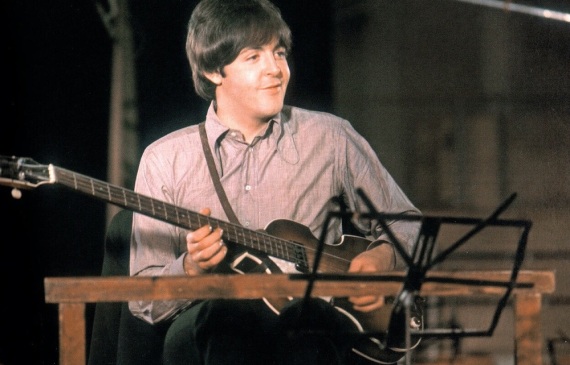
- “Yellow Submarine” (2:41) – It’s the Ringo song on the record. It’s fun. It’s an easy sing-along. It is a child’s song, and it’s never been my favorite. In fact, I think it’s the weakest moment on the album. Having said that, it has its own whimsical charm and its inclusion here is not fatal.
“So we sailed up to the sun
Till we found the sea of green
And we lived beneath the waves
In our yellow submarine.”
It was Ringo’s first lead vocal on a Beatles single and it reached number two on the US Billboard chart. If anything, it just shows how The Beatles were willing to take a left turn when everyone expected them to go right.
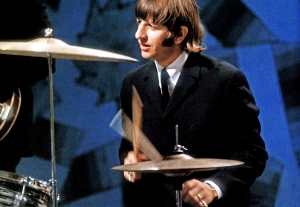
- “She Said She Said” (2:37) – This was the final track recorded for Revolver. It was inspired by an LA acid trip and from a conversation between Lennon, Harrison and actor Peter Fonda. Its Byrds-like chiming guitar sounds fantastic and John turned in a great vocal.
“She said
I know what it’s like to be dead
I know what it is to be sad
And she’s making me feel like I’ve never been born”
Interestingly, Paul did not play on it. George played bass on the track. Apparently, the guys were having a good time at a party and Peter Fonda was killing their buzz with talk about “I know what it’s like to be dead.”
SIDE 2
- “Good Day Sunshine” (2:08) – This was The Beatles’ nod to The Lovin’ Spoonful’s “Daydream,” a song they greatly admired. It was a wonderful way to start side 2 and it’s a song that just makes you feel good. The working title was “A Good Day’s Sunshine.”
“I need to laugh and when the sun is out
I’ve got something I can laugh about
I feel good in a special way
I’m in love and it’s a sunny day.”
There was nothing profound in there; it was just a happy Beatles song. It has even been used as the wake-up music on multiple Space Shuttle missions and why not? It was a much better choice than “Ground control to Major Tom” since Major Tom never made it back.
https://www.youtube.com/watch?v=JcjOeoEsBaQ
- “And Your Bird Can Sing” (2:00) – Not only is this my favorite song on the record, it’s one of my favorite Beatles songs period. Dammit, I love it. It hits 100 mph from the first note and never lets up. It is pure joy; the cascading guitar harmonies, the exquisite Beatle harmonies, and one of the best John Lennon vocals ever. I don’t know what the hell the song’s about and it doesn’t matter.
“When your prized possessions start to weigh you down
Look in my direction, I’ll be ’round, I’ll be ’round”
The duel-guitar arrangement behind the vocal is a thing of beauty and genius, and its effect on me hasn’t diminished one bit over the years. Lennon described it as a “throwaway.” Not for me. It still gets me pumped.
https://www.youtube.com/watch?v=4KlI7qwvZM8
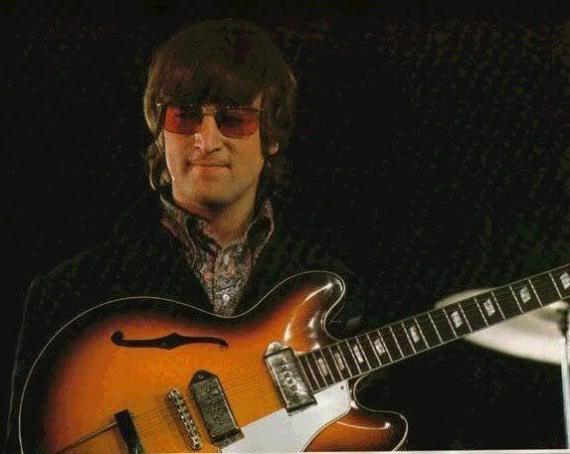
- “For No One” (2:00) – “For No One” is a terrific piece of songwriting about the end of a relationship when he was seeing Jane Asher. It’s one of Paul’s best.
“And in her eyes you see nothing
No sign of love behind the tears
Cried for no one
A love that should have lasted years.”
The song’s sturdy melody has worn well over the many years. The original working title to this little baroque pop song was “Why Did it Die?” The beautiful French horn solo was played by one of London’s best horn players, Alan Civil.
https://www.youtube.com/watch?v=SuvMcoZVYUM
- “Doctor Robert” (2:14) – This cool rocker features another great John Lennon vocal. It was about a New York physician who was known for giving B-12 injections containing large doses of amphetamines, mainly to rich New Yorkers.
“Doctor Robert
He’s a man you must believe
Helping anyone in need
No one can succeed like
Doctor Robert.”
Paul McCartney’s high harmony vocal really kicks it up nicely. I love the country-funk guitar part and it’s one of my favorite tracks on Revolver. My only complaint is that it ends too soon.
- “I Want to Tell You” (2:29) – This is a nice George Harrison tune with a very cool central guitar riff. George said it addresses “the avalanche of thoughts that are so hard to write down or say or transmit.”
“I want to tell you
My head is filled with things to say
When you’re here
All those words they seem to slip away.”
George cited his increasing experiences with LSD as a big factor in increasing his awareness. This was the first time that Paul laid on his bass part after the rhythm track had been completed; a practice that became much more common on subsequent recordings.
https://www.youtube.com/watch?v=NVchN_7iNR0
- “Got to Get You into My Life” (2:29) – This is The Beatles’ tribute to the Motown Sound and features a prominent horn arrangement. Written under the guise of a love song, it was actually “an ode to pot.”
“What can I do, what can I be
When I’m with you I want to stay there
If I’m true I’ll never leave
And if I do I know the way there.”
It’s also one of the truly great Paul McCartney lead vocals. Check out his ad-lib vocals on the fade.
https://www.youtube.com/watch?v=_uA4sh9lcZE
- “Tomorrow Never Knows” (2:57) – This is one of the most celebrated tracks in Beatles lore and a wonderful example of the studio wizardry of the studio team. It was the final track on the album but the first to be recorded. It was The Beatles getting “out there.” Far out there. It featured a droning one-chord structure with a completely cool Ringo drum groove and a fantastic John Lennon vocal, which was described as sounding like a “thousand monks chanting on a hill.” They invented artificial double tracking to double John’s voice and there were also various tape loops, as well as reverse guitar sounds. It was experimental to the max and it broke new ground. Their innovations could be decidedly low-tech as well. The album’s distinctive drum sound was accomplished by stuffing Ringo’s wool sweater into the bass drum.
“Turn off your mind, relax and float down stream
It is not dying, it is not dying
Lay down all thoughts, surrender to the void
It is shining, it is shining.”
The lyrics were adapted from the Tibetan Book of the Dead and is an explanation of the process and meaning of meditation. The title was originally “The Void” but they eventually turned to one of Ringo’s little malapropisms that he was so well known for. It was The Beatles doing their Beatles thing in the most creative way.
https://www.youtube.com/watch?v=7UjvdZm-Tu8
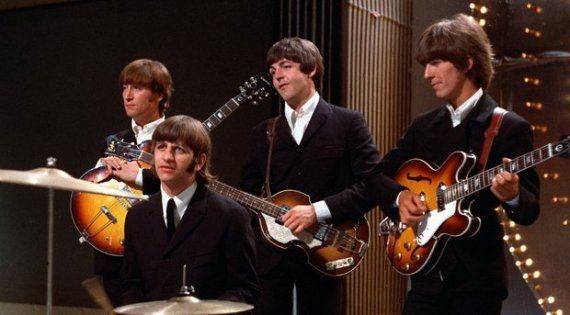
For years, I thought Rubber Soul was my favorite Beatles record with its change in direction and more mature songwriting and sound. The White Album held me spellbound for a time too, though it was missing that “band” thing. It was more like a collection of solo material. I loved Sgt Pepper’s from first note to last and I loved analyzing the cover art too. “Getting Better” completely rocked my world. I eventually settled on Abbey Road as their best record and stayed there for years. The legendary guitar battle on side 2 held me forever spellbound. But in writing this profile, I am again confused. The Beatles on Revolver were so joyous and rocking; so clever and musical. I guess it doesn’t matter. But one wonders how the next record could be so different from Revolver? Most bands would make several variations of the same album, but not The Beatles. The next album was completely different because The Beatles themselves were changing. Such was their own incredible growth as musicians and human beings. That incredible growth was destined to limit their lifespan as a unit. Their short career really was a supernova. I wish we could do it all over again.
And now, only half of them are still with us. Even George Martin has beamed up to that great mixing board in the sky. What must it be like to be Paul and Ringo now? They lived the dream of the greatest rock band that ever was. And one day, they too will be gone. Thank goodness for the music. Human beings are fragile creatures but, thankfully, the music on Revolver will last forever.